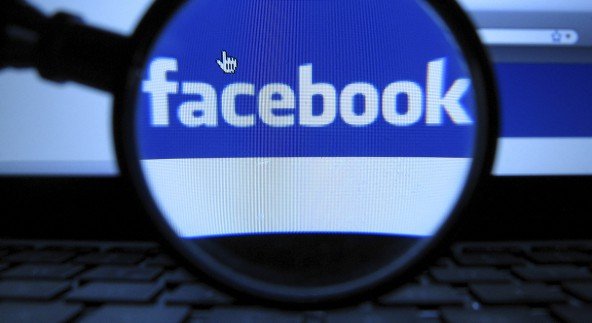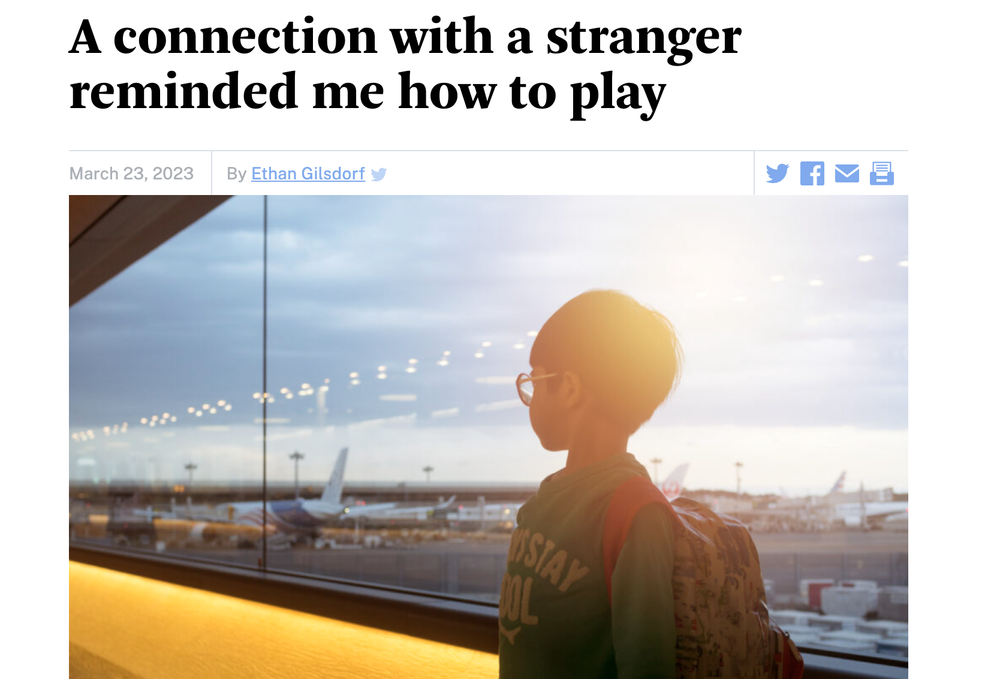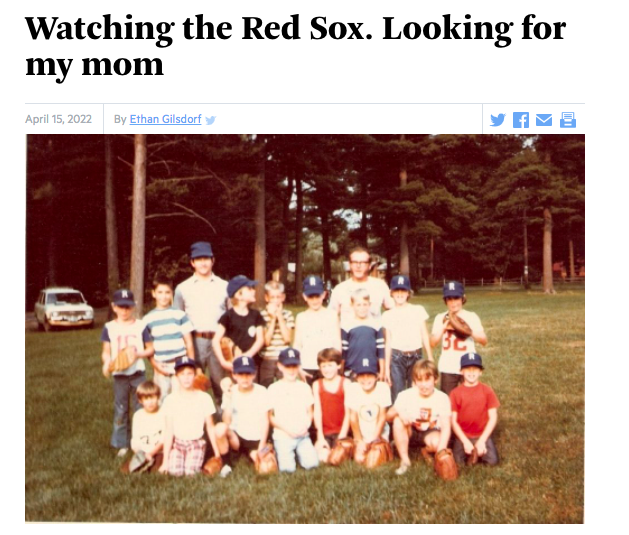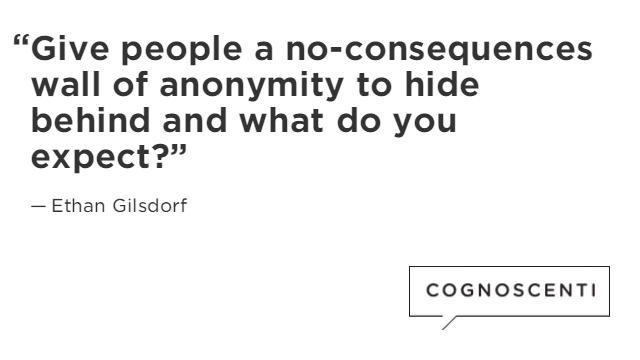A connection with a stranger reminded me how to play
Over on WBUR's Cognoscenti, I published an essay about a chance, playful encounter with a boy in an airport and how that got my in touch with the power of play. Enjoy.
Watching the Red Sox. Looking for my mom
Did your mother coach your Little League team? Mine did. On #RedSox home opener day, my nostalgic reminincience, for WBUR Cognoscenti.
Why I'm against online comment forums
Why am I against online comment forums? Increasingly, I see ad hominem attacks, “you’re a loser” name-calling, and Donald Trump-style playground insults --- all of which have come to pass for grown-up debate in America. Read the rest over on WBUR's Cognoscenti.
‘Star Wars,’ And The Force It Awakened In Me
 “Star Wars” and its sequels were touchstones, mind-bending fantasy movie experiences into which I poured my longings for escape, creativity and adventure. Read the rest of the essay here.
“Star Wars” and its sequels were touchstones, mind-bending fantasy movie experiences into which I poured my longings for escape, creativity and adventure. Read the rest of the essay here.
Help, My Computer Is Turning Me Into A Robot

The first three months of 2014 have given us three momentous milestones in technology. There was the 30th anniversary of the Macintosh personal computer back in January. Then came the 10th birthday of Facebook in February. March celebrated 25 years since the beginning of the World Wide Web.
These technologies have made us more connected, more adept, more independent and more informed. Seemingly overnight, they’ve become irreplaceable tools for the workplace and for leisure, allowing us to do things we’d previously never dreamed possible: send messages at the blink of an eye, search vast databases from our homes and offices, and store vast amounts of information. Computers, social media and the Web have unleashed a powerful, creative DIY force. We are now our own secretaries, publishers and number-crunchers. We are indeed powerful.
But to what end?
Much has been written about technology’s downside. Largely, that critique centers on its de-socializing effects. The Internet and our smart devices distract us, and addict us. They tempt us to not “be present” in real world space. I often feel these things to be true. But my take on the dehumanizing aspects of digital technology is somewhat different.
My fear is this: Has my trusty and seemingly innocuous MacBook Air made me more robot-like? Have our computers turned us into them?
Obscene income inequality is immoral
 The current disparity between what executives make vs. rank-and-file employees is nothing short of immoral. But sadly the battle for improved pay equity across America’s workforce isn’t going to be won anytime soon.
The current disparity between what executives make vs. rank-and-file employees is nothing short of immoral. But sadly the battle for improved pay equity across America’s workforce isn’t going to be won anytime soon.
 The current disparity between what executives make vs. rank-and-file employees is nothing short of immoral. But sadly the battle for improved pay equity across America’s workforce isn’t going to be won anytime soon.
The current disparity between what executives make vs. rank-and-file employees is nothing short of immoral. But sadly the battle for improved pay equity across America’s workforce isn’t going to be won anytime soon.
In 2012, CEOs of S&P 500 companies made, on average, an astounding 354 times more than the average U.S. worker, according to the AFL-CIO. The ugly numbers continue. Of some 141 countries, the U.S. ranks fourth highest in “wealth inequality,” trailing only Russia, Ukraine and Lebanon.
But there is hope. Some companies — admittedly, a vast minority — do voluntarily cap their top executives’ salaries. For example, Whole Foods Market won’t pay its CEO more than 19 times the company’s average annual wage.
You can read the rest of my column for WBUR's Cognoscenti here.
Put Down The Camera, Pick Up The Fork

Food — you know that stuff you put in your mouth, chew and swallow to stay alive? — has officially jumped the shark.
 Remember when food was just something you ate?
Remember when food was just something you ate?
Food — you know that stuff you put in your mouth, chew and swallow to stay alive? — has officially jumped the shark.
I’m not exactly sure when it happened. Was it the molecular gastronomy craze of a few years ago, when chefs squirted popcorn and gumdrop foam over your duck breast, and suddenly preparing a meal became a science experiment?
Or was it the proliferation of celebrity cooking and food travel shows, wherein Anthony Bourdain and a crack team of Navy Seals went undercover in Bangkok to bring back a rare mangosteen, then kept it alive in captivity back in his New York City walk-in cooler. (Slight exaggeration, but not so far from the truth.)
You can read the rest of my column for WBUR's Cognoscenti here.
Looking For ‘Likes’ In All The Wrong Places
 (image: AP)Does "like" = "love"? Feel a little beat up by social media sometimes? My essay about this topic, "Looking For ‘Likes’ In All The Wrong Places: On Social Media And Self-Worth," appeared on WBUR's Morning Edition, Mon Feb 4. Here's an excerpt, and you can listen to the piece I recorded below.
(image: AP)Does "like" = "love"? Feel a little beat up by social media sometimes? My essay about this topic, "Looking For ‘Likes’ In All The Wrong Places: On Social Media And Self-Worth," appeared on WBUR's Morning Edition, Mon Feb 4. Here's an excerpt, and you can listen to the piece I recorded below.
 (image: AP)Does "like" = "love"? Feel a little beat up by social media sometimes? My essay about this topic, "Looking For ‘Likes’ In All The Wrong Places: On Social Media And Self-Worth," appeared on WBUR's Morning Edition, Mon Feb 4. Here's an excerpt, and you can listen to the piece I recorded below.
(image: AP)Does "like" = "love"? Feel a little beat up by social media sometimes? My essay about this topic, "Looking For ‘Likes’ In All The Wrong Places: On Social Media And Self-Worth," appeared on WBUR's Morning Edition, Mon Feb 4. Here's an excerpt, and you can listen to the piece I recorded below.
We all know the feeling.
We post something on Facebook, say our latest gastronomical experiment, or a scathing takedown of a celebrity making a fool of himself. Or, we let fly a clever tweet paired with a shrewd hashtag we’re certain is going to go viral.
Then, crickets. As in, no “likes,” no retweets, no nothing.
And how does all this make us feel? More insignificant than if we’d posted nothing at all.
That’s the power, and danger, of social media.
You can read the rest here. And listen below.
The pitfalls of using science to prop up literature

""Hi, I’m lit-fitness celebrity JK Rowling. If you’re busy like me, then stay tuned because I’m excited to share with you the most innovative piece of emotional and interpersonal exercise equipment ever. I’m talking about the fastest, easiest way to make lightning-fast decisions and get your empathy into its best shape ever. ... Introducing, the great American novel."

"Hi, I’m lit-fitness celebrity JK Rowling. If you’re busy like me, then stay tuned because I’m excited to share with you the most innovative piece of emotional and interpersonal exercise equipment ever. I’m talking about the fastest, easiest way to make lightning-fast decisions and get your empathy into its best shape ever. ... Introducing, the great American novel."
We’ve always agreed that books are fun, diversionary, and entertaining. Now they are apparently as good for you as a bowl of bran flakes and a jog around the park.
There's a spate of new studies and research supporting what we’ve suspected all along: Reading is good for you. (Thanks, Mom.)
On one level, this is good news. I mean, who should be grumpy about research helping to boost the cultural relevance of an art form?
But on another level, I’m skeptical, and a little depressed, by this new kind of literary analysis. (I also think post-structuralist, Marxist, feminist, post-colonialist, and deconstructionist literary theories take the joy out of literature, but that’s another rant.) Is relying on laboratory research to tell us books make us better human beings a positive development?
In my lastest post for the WBUR blog "Cognoscneti," I argue that all these new studies showing that reading good literature is scientifically beneficial to us is, well, kind of depressing, taking all the mystery and magic out of reading. Check out the full post here.


